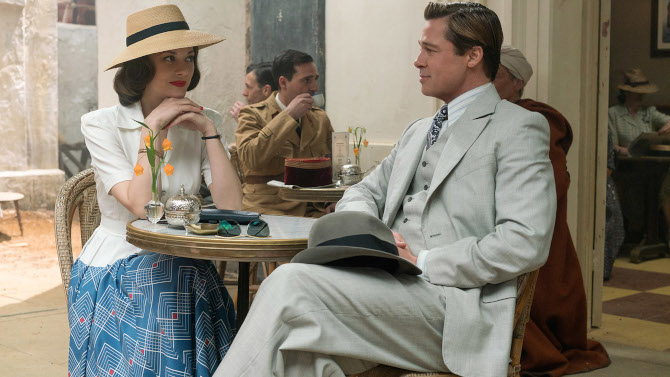
Déjà vu Dalliance
Channeling the mesmeric movies churned out by the studio system back in the 1930s and 40s, Allied (2016), directed by Robert Zemeckis, channels the likes of Morocco, Casablanca, Across the Pacific, Gilda, To Have and Have Not, and numerous others – attempting to find a spark from the classic themes of melodrama, romance, suspense and the epic nature of the annals of the cinematic past, with quite successful results. Set the year Casablanca and Across the Pacific were released – 1942, the story in fact starts in Morocco, with recently parachuted in Canadian spy Max Vatan (Brad Pitt) meeting up with another undercover agent, Marianne Beauséjour (Marion Cotillard), who will be pretending to be his wife.
-
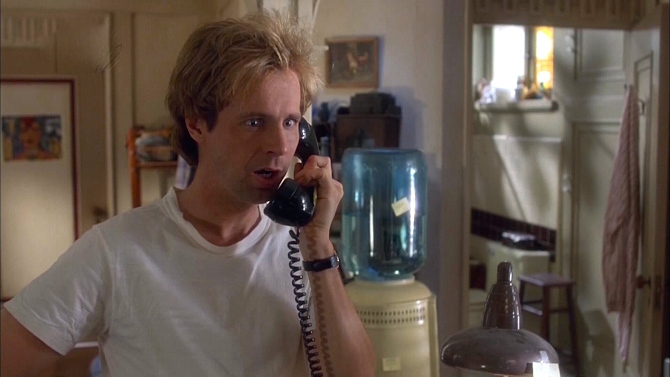
Wipe the Slate Clean
Clean SlateJanuary 5, 2022Riffing on the gumshoe detectives of yesteryear, 1994's Clean Slate, directed by Mick Jackson, is a bit like a comedic and much less complex version of Christopher Nolan’s Memento (2000). Poor Maurice Pogue (Dana Carvey) has a lot going on in his life: a former LAPD detective, the private eye will soon be taking the stand. . . as he witnessed a murder by a notorious one-thumb-missing gangster, Philip Cornell (Michael Gambon) – who’s always accompanied by two menacing bodyguards (Mark Bringelson and Christopher Meloni); though the supposedly murdered woman, Sarah Novak (Valeria Golino), has returned looking for the PI’s help – or is she simply a well chosen lookalike
-
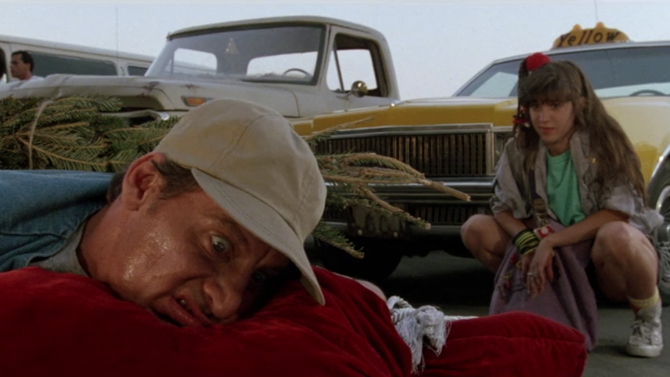
Christmas in Earnest
Ernest Saves ChristmasDecember 22, 2021A very different type of Christmas classic, 1988's Ernest Saves Christmas, directed by John R. Cherry III, is where season’s spirit meets slapstick comedy, saving Santa comes by way of snakes, and a taxi driver can concoct a plan to salvage Christmas morning for millions of youngsters. The third movie of the Ernest (Jim Varney) franchise finds the man driving taxi in Orlando (in fact, this was the first film to be shot at the new Disney/MGM Studios). Akin to limo driver Lloyd Christmas in Dumb and Dumber, his heart and soul is bigger than his brain. A huge lover of the holiday season, Ernest is pleased to give a man claiming to be the real Santa Claus (Douglas Seale) a ride.
-
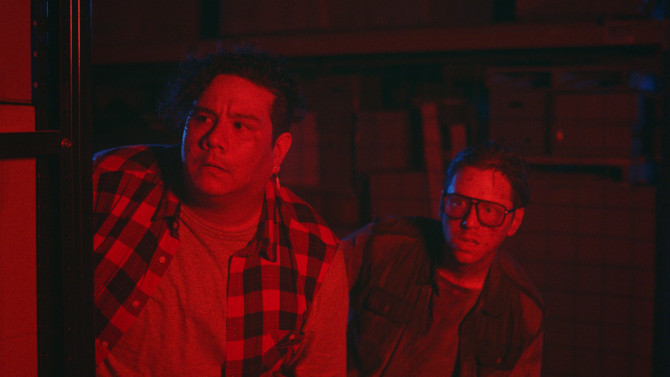
Calling All Demons
We Summoned a DemonOctober 29, 2021Reveling somewhere between cheesy 80s horror flick and Abbott and Costello buddy comedy slapstick, the 2017 short film We Summoned a Demon, written and directed by Chris McInroy, is six minutes of pure horror comedy goodness. Following a pair of less than cool guys, Kirk (Kirk C. Johnson) and Carlos (Carlos Larotta), they are really pulling at straws. . . as they’ve decided to attempt a satanic ritual to make the former a slick talking pick-up artist (of course, it’s all about getting a girl). After a ‘slight’ blood mishap, they inadvertently summon a glowing yellow eyed demon with horns that could qualify as overcompensating (John Orr).
-
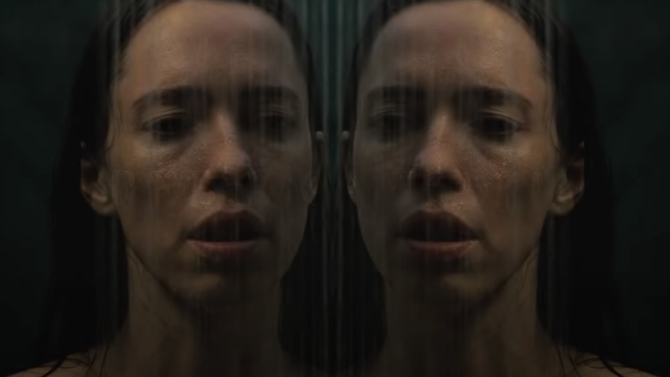
Home Is Where the Dark Is
The Night HouseOctober 27, 2021Almost as if Sigmund Freud, Edgar Allan Poe and Alfred Hitchcock got together to make a movie (Roman Polanski could probably be thrown into the group for good measure), 2020's The Night House lives in the realm of the double, the uncanny, as well as the horror found in grief and the chasm of nothingness it can bring with it. Written by Ben Collins and Luke Piotrowski, and directed by David Bruckner, the story follows teacher Beth (Rebecca Hall), the audience joining her immediately after the suicide of her husband, Owen (Evan Jonigkeit). Living in a bluff-top lake house that he himself built (the reflective water perhaps the first indication of the double), she might as well be out at sea. . . though she might not want that, as Owen killed himself on the water. And, when the darkness of night comes, Beth’s world feels like an encased glass tomb.
-
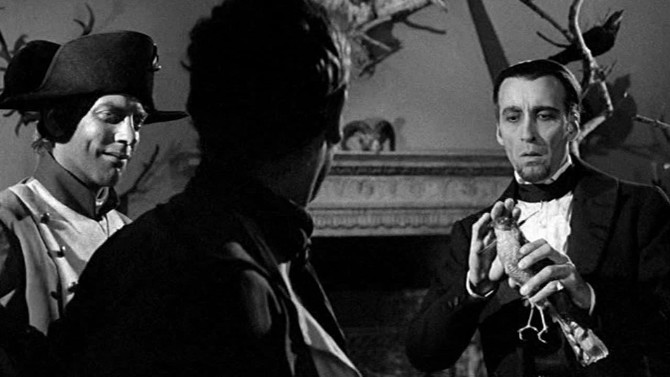
Mi Castle, Su Castle
The Castle of the Living DeadOctober 25, 2021Put this piece of advice in your memory banks – if you ever get invited to perform at a location called The Castle of the Living Dead, it might be best to decline the offer. A 1964 low budget horror film co-written and directed by first timer Warren Kiefer, it has stood the test of time thanks to two memorable performers and its real life Italian castle setting. The story of a traveling acting troupe, all is not right. . . for leader Bruno (Jacques Stany) has drawn the ire of harlequin performer Dart – who desperately wants his money up front. Taking umbrage with everything he does, a fight ensues, with bystander and former military officer Eric (Philippe Leroy) thankfully stepping in to stop the close to deadly tussle. With Eric deciding to take over the role of the harlequin. . . though not before Dart casts a deadly threat at Bruno and the troupe, this ominous departure does not sit well with the other members, ingenue Laura (Gaia Germani) and adventurous little person Nick (Antonio De Martino).
-
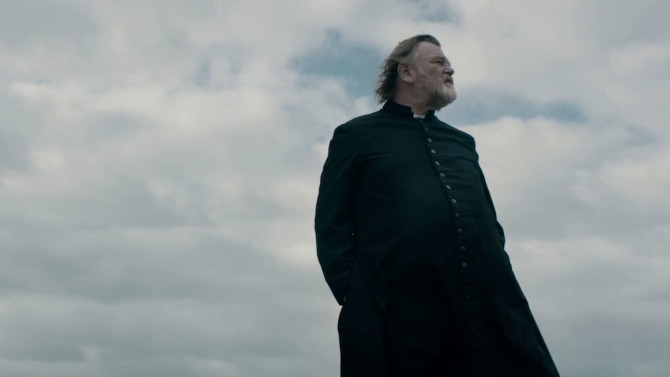
Skull Ireland
CalvaryJune 1, 2021John Michael McDonagh’s follow up to The Guard, 2014's Calvary (which he again writes and directs), is a thought provoking mystery infused drama which delves into irony, theology, predestination, and how the wounds of the past influence the present in most powerful ways. Opening with a quotation from Saint Augustine – “Do not despair; one of the thieves was saved. Do not presume; one of the thieves was damned.”, we are then introduced to our main character, Father James (Brendan Gleeson), a good man in small town Ireland. Originally married with a daughter, when his wife died, he followed a calling to the priesthood, attempting to impart his spiritual wisdom and some much needed solace to his flock.
